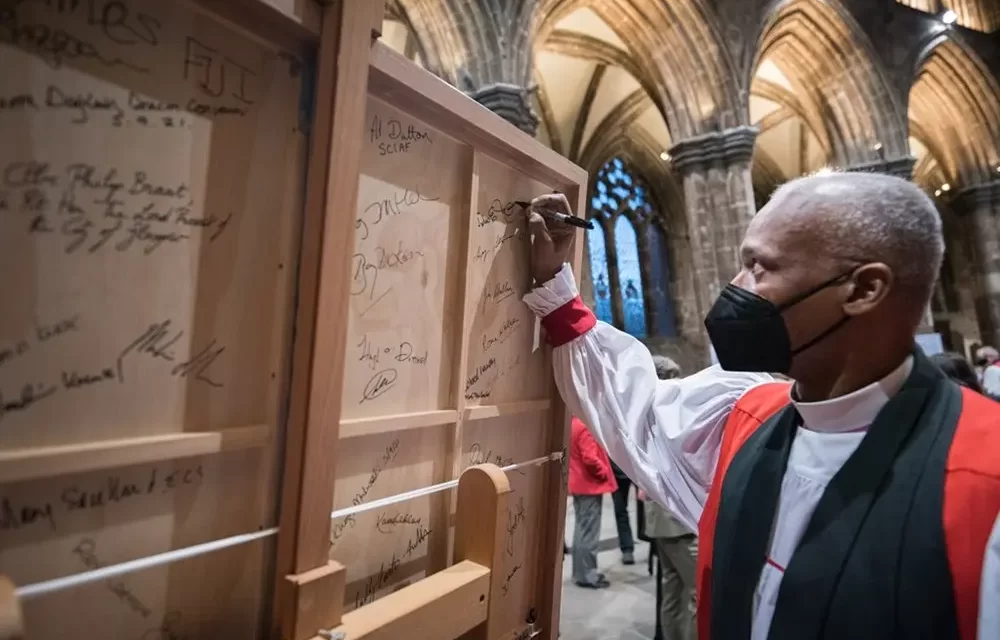One such is the Archbishop of Central America and Bishop of Panama, the Most Revd Julio Murray. The part played by faith communities, he said last Friday, must not be underestimated when considering the impact of climate change.
“As a representative of the delegation from the Anglican Communion, I believe that COP26 is an opportunity to introduce concrete action in response to one of our mission imperatives: to safeguard the integrity of all creation,” he said. “Governments, private sector business, and multilateral organisations should recognise the strategic importance of faith actors.”
Central America is one of the most vulnerable regions to climate change, and contains some of the richest eco-systems, as well as communities living on the front line of the climate crisis. “All the countries in the Central American region are experiencing flooding, and also food scarcity due to climate change. This also results in forced migration, which impacts on the region,” Archbishop Murray said.
The part played by church leaders, he said, was not just to raise awareness: it could also be a source of concrete solutions. “Anglicans across the world have long been engaged with environmental concerns. Anglicans are on the front line of the climate emergency, and are also actively involved in shaping solutions. We have the capacity to leverage our shared identity to mobilise our networks for climate justice and climate action.”
Among the outcomes he hopes to see is strengthening climate resilience at the local level, providing the latest clean-energy technology and sharing the global burden fairly, as richer nations take their fair share of responsibility for having caused the problem.
“These recommendations are meant to offer concrete suggestions to policy-makers,” he said. “They are some of the outcomes that we see can happen as concrete actions once COP26 is over. So we encourage faith leaders in the local context to get in contact with their governments, to find out what are the agreements they have signed on to, and to make a strategic partnership with them in order to follow through and follow up on the commitments made at COP26.”
For the Archbishop, the solution also involves a spiritual reawakening. He said: “Not only the Church in Central America, but also the Churches which are part of the Anglican Communion are working to tackle climate change. We express the power of the Holy Spirit at this unprecedented time. This involves more than advocacy and activism: it involves a deeper level of pastoral guidance, innovative approaches to financial and environmental stewardship, and a spiritual and ecological vision, as we organise ourselves better to serve. We encourage governments so that they will be partners along with faith leaders in their different countries.”
He continued: “I would ask UK Christians to partner in building resilience and in promoting justice. To encourage their own government to support governments in developing countries in Central America and the world to prepare programmes that respond to the damage and impact caused by the climate change. To join us as we pray and work together to be better stewards of creation, and to make sure that all people have what they need to live as human beings, with dignity and respect.”
The need for greater urgency at the Glasgow talks was raised by church leaders from the Amazon. In a joint statement from the Bishops’ Conference of the Amazon and the Pan-Amazon Ecclesial Network, they express their “bewilderment” and “sense of helplessness” in the face of the “catastrophic impact” that climate change is having on humanity and the environment, and plead for “tangible results leading to a change of route once and for all”.
On Saturday, the synod of the diocese of Norwich voted by 61 votes to five to disinvest from fossil fuels. The Priest-in-Charge of Martham and Repps with Bastwick, Thurne and Clippesby, the Revd Dr Steven Sivyer, the proposer of the motion, welcomed the outcome. He said: “I am delighted. There was a reasoned and thoughtful debate, and this is just the start of a wider move to look across our investments.
“Our Christian duty is to be good stewards of God’s creation. The purpose of this motion is so that we do not profit from the practices that are destroying our environment, so that our actions are informed by our morals, which are guided by our faith.”
On Monday, the Christian conservation charity A Rocha announced that it hopes to regenerate 75,000 acres of church land for nature and cutting carbon over the next five years. The Christian community in the UK owns or manages more than 500,000 acres of land, from churchyards and conference-centre grounds to urban community farms and agricultural estates. Twenty-five land managers with more than 1800 acres of land are committed to participating in this initiative, and a further 40 Christian land managers are looking at joining the Partners in Action scheme.
Source
Image Source
Tags: Archbishop of Central America, Bishop of Panama


